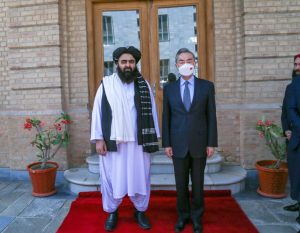“China is our most important partner and represents a fundamental and extraordinary opportunity for us,” Taliban spokesperson Zabihullah Mujahid said in September 2021, shortly after the Taliban retook power in Afghanistan. Late last month, China reciprocated this enthusiasm by hosting members of the Taliban in addition to the foreign ministers from Afghanistan’s neighbors to discuss the Taliban-led country’s economic development and security. Beijing’s courtship of the Taliban only adds to instability in the region, challenging the U.S. and its allies to find new ways to deal with the combined threat.
A week prior to the foreign ministers’ meeting, China’s top diplomat, Wang Yi, stopped by Kabul for discussions with acting Afghan Foreign Minister Amir Khan Muttaqi. Conversations reportedly focused on improving Afghanistan’s mining sector as well as Afghanistan’s role in China’s Belt and Road Initiative (BRI). Wang is the most senior Chinese official to visit since the Taliban seized control of the country. His arrival in Kabul came one day after the Taliban faced robust international criticism for reversing its earlier pledge to allow secondary schooling for girls.
China’s burgeoning relationship with the Taliban should come as no surprise, as improving ties has been a public goal of Beijing even prior to the U.S. withdrawal. In August 2021, after the fall of Kabul, China issued a statement saying it “respects the right of the Afghan people to independently determine their own destiny” and will develop “friendly and cooperative relations with Afghanistan.” Although China hasn’t yet formally recognized the Taliban, China’s rhetoric and continuing engagement suggest official recognition may not be far off.
Beijing is pursuing two main objectives through its outreach to the Taliban. The first is assurance from the Taliban that they will mitigate threats posed by extremist groups that operate close to China’s borders. In particular, Beijing wants the Taliban to stop the East Turkestan Islamic Movement (ETIM), which supports Uyghur separatism, from expanding and potentially carrying out attack targeting Chinese interests in the region.
Second, Beijing wants to protect the investments it has already made in Afghanistan and plans to make through programs like the BRI. Proposals by Chinese companies to extract and develop Afghanistan’s copper and oil deposits have been on hold for more than a decade due to political instability. With the United States gone, China hopes the Taliban can stabilize the country enough to resume these projects.
China’s willingness to partner with the Taliban undermines American efforts to influence the extremist group’s behavior through pressure campaigns and sanctions. Beijing has directly lobbied on Kabul’s behalf, demanding that Washington return Afghanistan’s frozen assets, a step that would only weaken U.S. leverage. At the aforementioned foreign ministers meeting, Chinese leader Xi Jinping’s statement called for more aid for Afghanistan and made no mention of the Taliban’s human rights record.
Although Washington cannot stop China from working with the group, the United States and likeminded partners can take steps to mitigate China’s growing influence in Afghanistan.
Specifically, Washington should seek New Delhi’s guidance in leading multilateral diplomacy, and developing political alternatives for Afghanistan. Although Afghanistan’s institutions are weak and threatened by the Taliban, Washington should follow New Delhi’s lead and support civil society organizations, businesses, and media alternatives to the Taliban both within Afghanistan and in the diasporic community.
To be sure, India has historically been reluctant to serve as the balancing power to China that Washington seeks in South Asia. Yet the Biden administration should understand India’s national interest in preventing regional dominance by Pakistan and China. A hostile Afghanistan supported by Pakistan and China would diminish India’s positive regional influence and further place New Delhi at the mercy of its rivals. China’s outreach to the Taliban also reaffirms the necessity for future conversations about mitigating Chinese influence in the broader Indo-Pacific as part of continuing dialogue among Australia, India, Japan, and America, also known as the Quad.
The Biden administration should also consider listing the Taliban as a Foreign Terrorist Organization (FTO). In 2002, then-President George W. Bush listed the Taliban as a Specially Designated Global Terrorist Entity (SDGT) to limit its access to the U.S. financial system, but the Taliban never appeared on the State Department’s FTO list. An FTO would be a stronger designation as it institutes a visa ban, requires U.S. banks to block the assets of the organization, and establishes criminal prohibitions on any U.S. person who provides the FTO with material support. Following the U.S. withdrawal from Afghanistan last year, Republicans in Congress introduced a bill arguing that the Taliban fit the criteria of an FTO and therefore warrant inclusion on the FTO list.
Yet the Biden administration has so far refused to add the Taliban to the list, likely fearing that such a step would undermine talks between Washington and Kabul. Given the Taliban’s continued rejection of international calls for reform, however, the White House should reconsider the value of talks.
Recent meetings between representatives from Beijing and Kabul threaten to subvert American interests for peace and stability in Asia. China’s actions undermine U.S. leverage and further legitimize the Taliban’s control of Afghanistan.

































